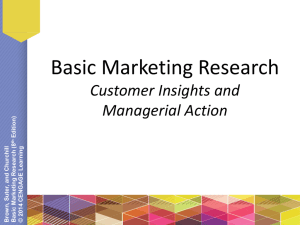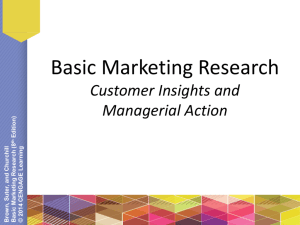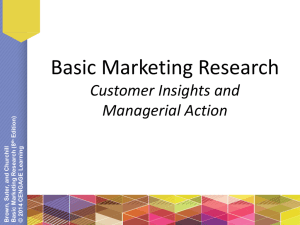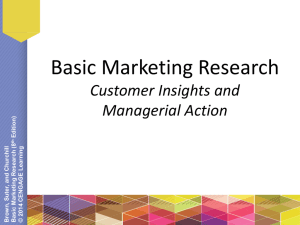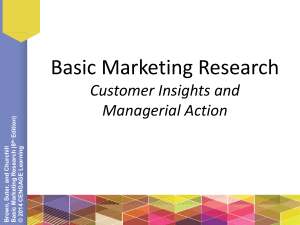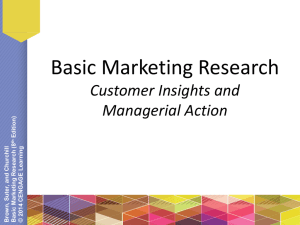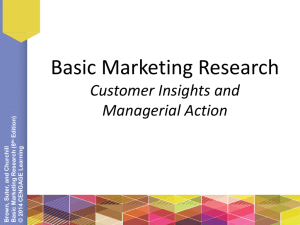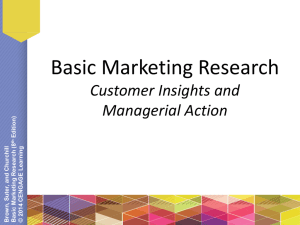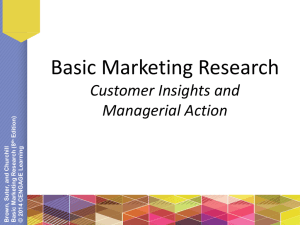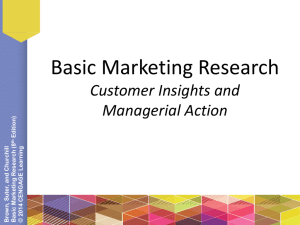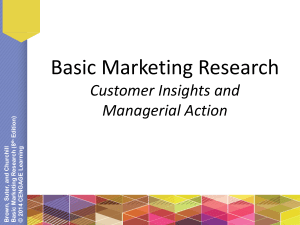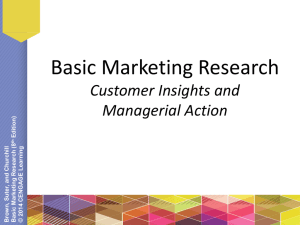Textbook
advertisement
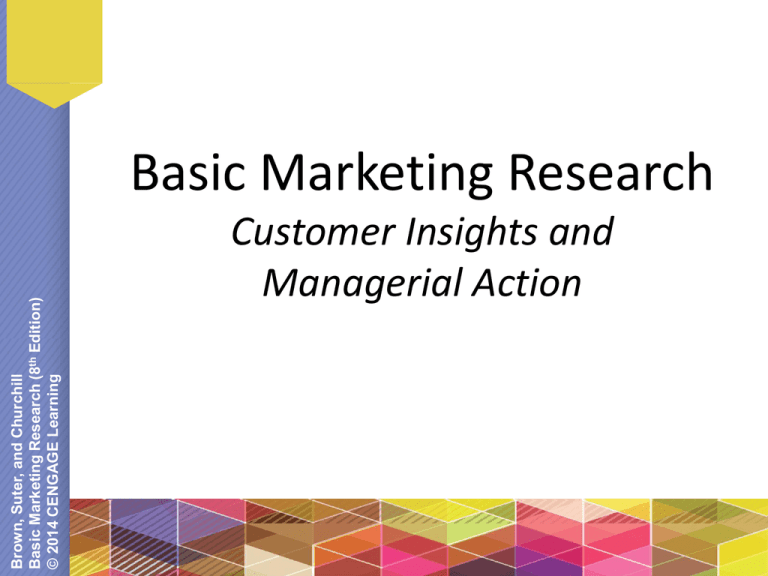
Brown, Suter, and Churchill Basic Marketing Research (8th Edition) © 2014 CENGAGE Learning Basic Marketing Research Customer Insights and Managerial Action Brown, Suter, and Churchill Basic Marketing Research (8th Edition) © 2014 CENGAGE Learning Chapter 2: The Research Process and Ethical Concerns Brown, Suter, and Churchill Basic Marketing Research (8th Edition) © 2014 CENGAGE Learning Stage One: Problem Definition (Chapters 3 and 4) Brown, Suter, and Churchill Basic Marketing Research (8th Edition) © 2014 CENGAGE Learning • Some key questions: – – – – – – – What is the purpose of the study? Is additional background information necessary? What is the source of the problem? Is the research discovery- or strategy-oriented? What information is needed to make the decision? How much is already known? Can a hypothesis be formulated? Stage Two: Data Collection (Chapters 5 - 15) Brown, Suter, and Churchill Basic Marketing Research (8th Edition) © 2014 CENGAGE Learning • Some key questions: – – – – – – Can existing data be retrieved from internal sources? Can existing data be retrieved from external sources? What is to be measured? How? What is the source of the data to be collected? Can observation techniques be used to gather data? How should observations be taken? Stage Two: Data Collection (Chapters 5 - 15) CONT’D Brown, Suter, and Churchill Basic Marketing Research (8th Edition) © 2014 CENGAGE Learning • Some key questions: – – – – – – Can objective answers be obtained by asking people? How should people be questioned? How should questionnaires be administered? Should structured or unstructured items be used? Should the purpose of the study be made known? What specific behaviors should be recorded? Stage Two: Data Collection (Chapters 5 - 15) CONT’D Brown, Suter, and Churchill Basic Marketing Research (8th Edition) © 2014 CENGAGE Learning • Some key questions: – – – – – – What criteria define the population? Is a list of population elements available? Is a probability sample desirable? How large should the sample be? Who will gather the data? How long will the data gathering take? Stage Three: Data Analysis (Chapters 16 - 18) • Some key questions: Brown, Suter, and Churchill Basic Marketing Research (8th Edition) © 2014 CENGAGE Learning – Who will handle the editing of the data? – How will the data be coded? – What analysis techniques will be used? Stage Four: Information Reporting (Chapters 19 and 20) Brown, Suter, and Churchill Basic Marketing Research (8th Edition) © 2014 CENGAGE Learning • Some key questions: – – – – – – – Who will read the report? What is their technical level of sophistication? What is their involvement with the project? Are managerial recommendations called for? What will be the format of the written report? Is an oral report necessary? How should the oral report be structured? Gathering Marketing Intelligence • The Project Approach (FLASHLIGHT) Brown, Suter, and Churchill Basic Marketing Research (8th Edition) © 2014 CENGAGE Learning – collecting data to address specific problems • The Systems Approach (CANDLE) – Putting systems in place to provide marketing intelligence on an ongoing basis Brown, Suter, and Churchill Basic Marketing Research (8th Edition) © 2014 CENGAGE Learning Marketing Research Ethics Marketing Research Ethics Brown, Suter, and Churchill Basic Marketing Research (8th Edition) © 2014 CENGAGE Learning • Marketing ethics: – The principles, values, and standards of conduct followed by marketers. ETHICS MATTER! Brown, Suter, and Churchill Basic Marketing Research (8th Edition) © 2014 CENGAGE Learning Three Methods of Ethical Reasoning Source: Adapted from Anne T. Lawrence and James Weber, Business and Society: Stakeholders, Ethics, Public Policy, 12th ed. (New York: McGraw-Hill Irwin, 2008), p. 106. Brown, Suter, and Churchill Basic Marketing Research (8th Edition) © 2014 CENGAGE Learning Ethics at the Grocery Store… You have been hired to help a large producer of vegetables understand how consumers shop for produce in grocery stores. The company is considering different methods of displaying nutritional content, because managers believe that if more people understood the nutritional value of their products they would make better decisions about what they eat. You have decided to use observational research—you will observe shoppers without their knowledge so that they won’t change their shopping behaviors. • Was the use of disguise ethical using the utility approach? • Was the use of disguise ethical using the justice approach? • Was the use of disguise ethical using the rights approach? Brown, Suter, and Churchill Basic Marketing Research (8th Edition) © 2014 CENGAGE Learning Brown, Suter, and Churchill Basic Marketing Research (8th Edition) © 2014 CENGAGE Learning Research Respondent Rights right to choose right to safety right to be informed right to be heard Research to Avoid • when the research is unethical – (e.g., competitive intelligence that goes too far; falsifying data; advocacy research; sugging) • when the research results would not be used Brown, Suter, and Churchill Basic Marketing Research (8th Edition) © 2014 CENGAGE Learning – (e.g., “I know better” managers) • when the manager specifies what the results should be • when you’re tempted to take short cuts: “death wish” research • when the costs of the research outweigh its potential benefits (and “costs” go beyond money)
